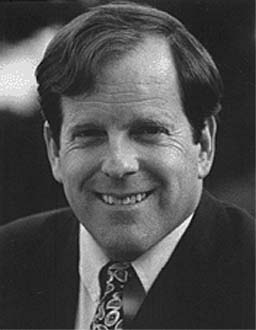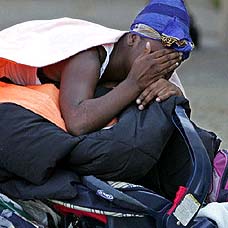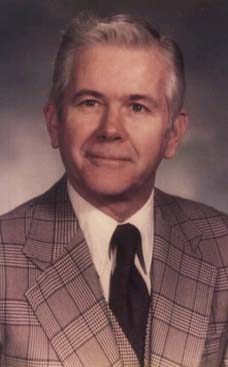
"Adapting to global warming is futile, but preparedness is imperative. Every city and state should assess its vulnerability to extreme weather and climate change overall. If California is likely to have less snowmelt, we need more water conservation and less unplanned development. If a faster snowmelt means that the Central Valley's levees are at a risk even greater than those of New Orleans, we need to spend the money to strengthen them. If higher sea levels mean re-engineered sewage-treatment plants, we should set aside the money to pay for them now. If catastrophic fires and hurricanes are inevitable, we must tighten our building codes and require developers to build more defensible homes." Sierra Club President Carl Pope served as a Peace Corps Volunteer in India in the 1960's.
Carl Pope writes: Preparing for Global Warming
Carl Pope - Preparing for Global Warming
Source: Sierra Club
[Oct 03, 2005]
SYNOPSIS: But preparedness alone is a stopgap. We need prevention, and the only way to limit our overall vulnerability is to rein in the greenhouse pollutants that are driving global warming.
When I set out on a monthlong trip to Asia this summer, I wasn't prepared for time travel.
My journey turned out to be a tour of catastrophic weather-related disasters: devastating floods in Bombay; vast drought-related fires and smoke in Sumatra; and, upon my return, Hurricane Katrina. Most climate scientists have been predicting that global warming would spawn an increasing number of these events in the future. Seeing all three catastrophes at once led me to one conclusion: That future is now.
There is no way to link any of these individual tragedies to global warming, just as you can't link any one cigarette to lung cancer. But the implications of climate change and the high costs of doing nothing are impossible to ignore. Conservative estimates peg the cost of the Katrina recovery at $70 billion.
The global-warming cynics have tried to distract us with the argument that because we don't know exactly how global-warming pollutants will change the climate, we don't need to act quickly to reduce emissions. They also claim that we would be better off trying to adapt our societies to global warming instead of taking precautionary measures to prevent it. They speak of adaptation, an after-the-fact concept, not preparedness. They emulate Neville Chamberlain rather than Winston Churchill.
But the successive tragedies in Bombay, Malaysia and New Orleans show how thin the climate-variation band is that complex societies can handle. How could the 17 million people of Bombay prepare for 36 inches of rainfall in 24 hours? Well, they could do some things -- such as not build highways that choke natural river beds, ban plastic bags that clog storm drains and protect their mangroves. But if we keep pumping greenhouse gases into the atmosphere, and 36 inches becomes 48, even those measures won't keep up.
Adapting to global warming is futile, but preparedness is imperative. Every city and state should assess its vulnerability to extreme weather and climate change overall. If California is likely to have less snowmelt, we need more water conservation and less unplanned development. If a faster snowmelt means that the Central Valley's levees are at a risk even greater than those of New Orleans, we need to spend the money to strengthen them. If higher sea levels mean re-engineered sewage-treatment plants, we should set aside the money to pay for them now. If catastrophic fires and hurricanes are inevitable, we must tighten our building codes and require developers to build more defensible homes.
But preparedness alone is a stopgap. We need prevention, and the only way to limit our overall vulnerability is to rein in the greenhouse pollutants that are driving global warming. I am willing to bet that Americans everywhere would be willing to do their part, if given the chance.
I'd put my money on people such as Savannah Rose Walters, age 12, of Odessa, Fla. After learning that Americans waste 4 million gallons of oil every day by not properly inflating their tires, Savannah got such companies as Sears and Goodyear to donate 1,000 tire gauges and launched a local public-education campaign to get people to "Pump 'Em Up!"
People are so hungry for global-warming solutions that Jerry's Famous Deli in Studio City delivers your rye-bread in a hybrid. Or consider the renaissance in public transit in cities such as Denver, Salt Lake City and even Los Angeles. If 1 in 10 Americans regularly used transit, the United States would reduce its oil consumption by 40 percent, according to figures from the Center for Transportation Excellence. If you don't have faith that Americans will do their part, remember that a third of California residents responded to the 2001 energy crisis by reducing their energy demand by at least 20 percent.
But individual Americans can only do so much without the leadership of government. People can buy a more efficient car or air conditioner, but they can't design one. Our government should set the pace for technological innovation, starting with our cars. Automakers have, but are not fully using, hybrid and other existing technology to make cars, trucks and SUVs run cleaner and go farther on a gallon of gas. If the federal government simply required automakers to use the best available technology, all vehicles could average 40 miles per gallon within 10 years.
Federal lawmakers should take a cue from states and cities that are already leading the way. California and several other states already require automakers to make cleaner vehicles. Charlotte, N.C., just decided to convert its entire municipal fleet to hybrid vehicles. More than 175 mayors across America, including San Francisco's Gavin Newsom, signed a Climate Protection Agreement committing their cities to reduce global-warming emissions.
After Katrina, our country has never been more ready to embrace a new energy future to make us more secure in every way. In failing to recognize this, our leaders in Washington have exposed themselves as dangerously out of touch.
There's an old saying that everyone talks about the weather, but no one ever does anything about it. If our federal government doesn't act now to reduce global-warming pollution (adopting the same emissions standards for cars as California would be a huge first step), that's exactly what future generations will say about us.
Carl Pope is executive director of the Sierra Club












